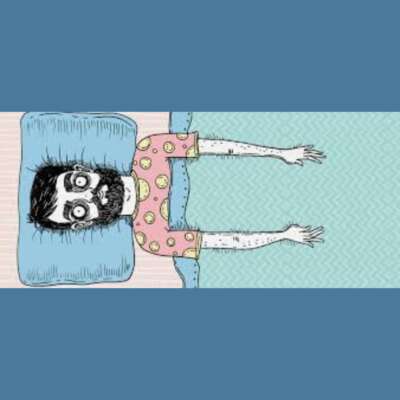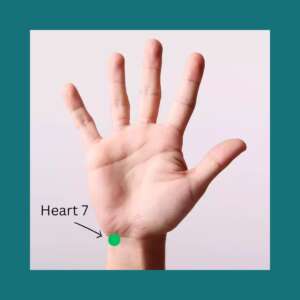
Almost everyone has experienced that feeling where you’re exhausted, lying in bed and your mind refuses to slow down. Your heart might be racing slightly, your thoughts churning, as sleep feels frustratingly out of reach. That sensation of being “tired but wired” as bedtime approaches is all too common for insomniacs, particularly the anxious type sleeper.
The anxious type sleeper often experiences trouble initiating sleep for up to a couple of hours. They may be tired but not groggy, feeling exhausted yet somehow wide awake simultaneously. They might become drowsy while reading, but as soon as they put the book down and turn off the light, they feel wide awake again.
In East Asian Medicine (EAM), the heart is considered the emperor of all organs. It governs not just physical circulation but also our emotional life and mental stability. When heart energy is weak or disturbed, we experience anxiety, emotional fragility and difficulty transitioning into sleep.
This connection isn’t just ancient wisdom. Modern research increasingly recognizes the powerful relationship between heart function, anxiety and sleep onset. Heart rate variability (HRV), a measure of the variation in time between heartbeats, is now used as a key indicator of both emotional resilience and sleep quality.
EAM has some offerings that can help the anxious sleeper. One of these is an acupressure point located on both wrists. Heart 7 (Shenmen) is known as the “Spirit Gate.” This name reflects this point’s profound ability to help your spirit settle and rest peacefully.
When the Spirit Gate is open and functioning well, your spirit can transition smoothly from the active, anxious state of wakefulness into peaceful sleep. When blocked, anxiety increases, making it difficult to fall asleep even when physically exhausted.
For thousands of years, EAM practitioners have recognized this point as one of the most powerful for calming anxiety, soothing heart palpitations and addressing sleep issues, particularly for the anxious type sleeper who struggles with falling asleep due to an unsettled mind.
From a Western perspective and based on multiple studies, stimulating Heart 7 activates the parasympathetic nervous system, which is your body’s “rest and digest” setting. It helps lower blood pressure, slows the heart rate and reduces stress hormones like cortisol that keep you wired and alert.
But from a EAM perspective, the explanation goes deeper. The Heart houses the Shen (spirit or mind), and when your Heart energy is balanced, your emotions are stable and sleep comes naturally. When Heart energy is disturbed, often by stress, worry or significant life changes, your Shen (aka mind) becomes unsettled, manifesting as anxiety and difficulty falling asleep.
Heart 7 is located on the inner wrist, in the small depression on the outer edge of the wrist crease (the pinky side of your wrist). If you turn your palm up and look at your wrist crease, it’s right where the crease ends near your little finger. This point can be found on either wrist. When you find the right spot, it might feel slightly tender when pressed. This is not uncommon and actually a good sign you’re in the right place.

This point is particularly valuable for pre-sleep anxiety. The benefits include calming the nervous system before bed, reducing anxiety about sleep itself, easing the transition from wakefulness to sleep, creating a sense of emotional safety and supporting heart-centered feelings of peace and contentment
The key is regular practice. Think of it as training your nervous system to recognize this pressure as a signal to transition into rest mode. Here’s how to utilize acupressure at home to help with your sleep anxiety:
1. Find the Heart 7 acupressure point.
2. Apply firm but gentle pressure with your thumb.
3. Move the thumb in small circular motions over the point for 2-3 minutes.
4. Breathe deeply while applying pressure and focusing on the exhale.
5. Repeat on the other wrist.
For sleep onset and anxiety issues, using acupressure on Heart 7 should be done about 30 minutes before your desired sleep time and it can be made a regular part of your bedtime routine. It’s also recommended to use this technique during times of emotional turmoil or hormonal fluctuations. And lastly, this technique can be very helpful when traveling or sleeping in unfamiliar surroundings.
Combining Heart 7 stimulation with proper sleep foundations can also amplify its effectiveness. Creating a conducive sleep environment is crucial. Your bedroom should be a sanctuary dedicated to rest.
The hour before sleep is particularly important for the anxious type sleeper. Start the winding down process at least one hour before your intended bedtime. Put away electronics, dim the lights and engage in calming activities. This creates the perfect environment for Heart 7 to work its magic, enabling the anxious mind to finally let go and transition into sleep.
Remember that healing the anxious type sleeper’s insomnia requires work on the anxiety piece by soothing and supporting the nervous system. Massaging Heart 7 is one of those nourishing practices that tells the body and mind that everything is alright and safe enough to drop into sleep.
While self-acupressure at Heart 7 is extremely beneficial, there are times when professional acupuncture treatments might serve you better. If you suffer from chronic insomnia or chronic anxiety, you have significant sleep problems during your menstrual cycle, the sleep issues are affecting your ability to function daily or if self treatment isn’t providing enough relief, it might be time to consider regular acupuncture treatments to help break the cycle and restore healthy patterns.
Professional treatments can also address the deeper imbalances causing your sleep disturbances and typically includes a customized combination of points based on your specific pattern. Regular acupuncture sessions also have a cumulative effect that can be difficult to achieve with self-care alone. If you are curious about how acupuncture can help, please reach out to schedule an appointment.

